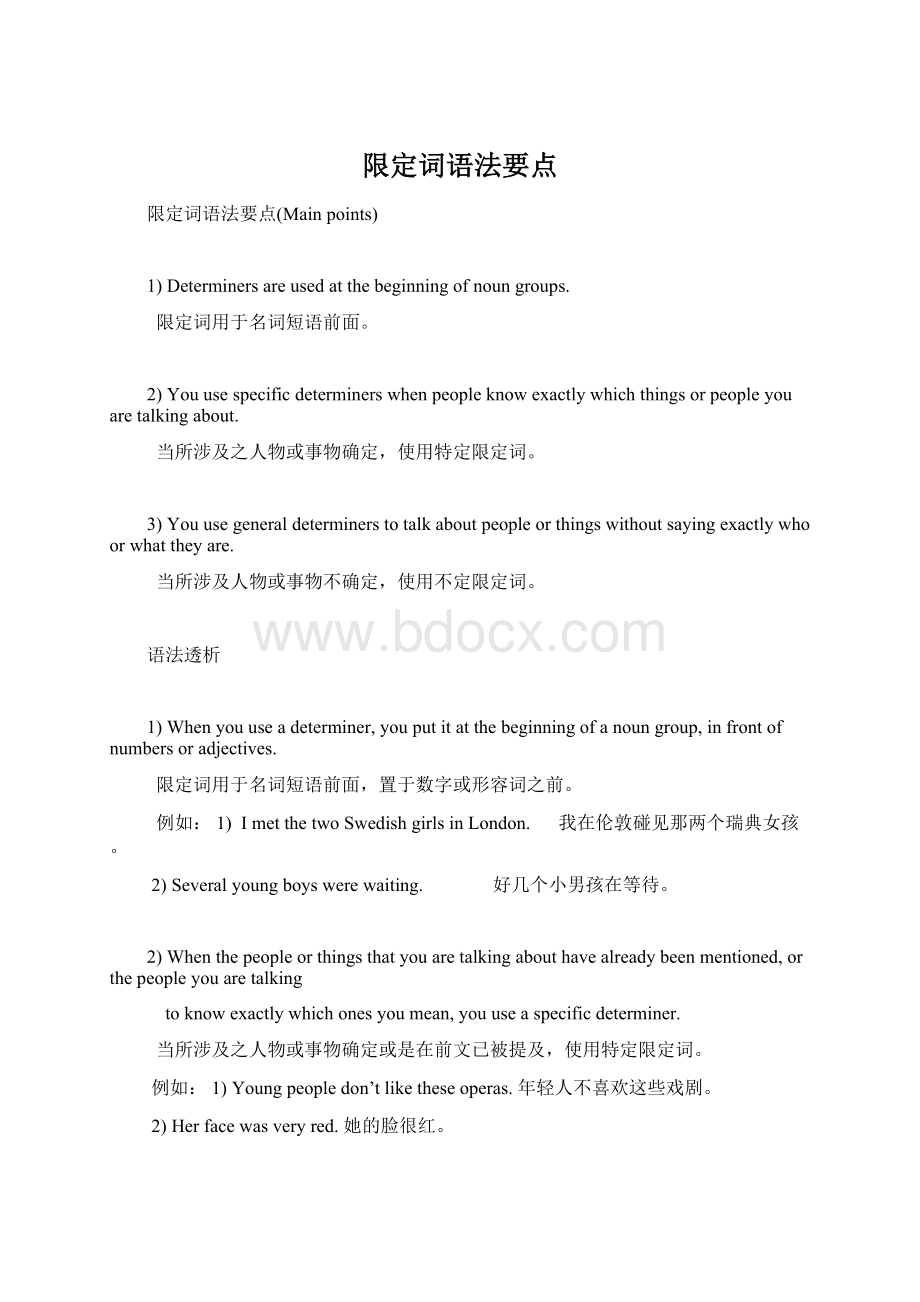限定词语法要点.docx
《限定词语法要点.docx》由会员分享,可在线阅读,更多相关《限定词语法要点.docx(35页珍藏版)》请在冰豆网上搜索。

限定词语法要点
限定词语法要点(Mainpoints)
1)Determinersareusedatthebeginningofnoungroups.
限定词用于名词短语前面。
2)Youusespecificdeterminerswhenpeopleknowexactlywhichthingsorpeopleyouaretalkingabout.
当所涉及之人物或事物确定,使用特定限定词。
3)Youusegeneraldeterminerstotalkaboutpeopleorthingswithoutsayingexactlywhoorwhattheyare.
当所涉及人物或事物不确定,使用不定限定词。
语法透析
1)Whenyouuseadeterminer,youputitatthebeginningofanoungroup,infrontofnumbersoradjectives.
限定词用于名词短语前面,置于数字或形容词之前。
例如:
1) ImetthetwoSwedishgirlsinLondon. 我在伦敦碰见那两个瑞典女孩。
2)Severalyoungboyswerewaiting. 好几个小男孩在等待。
2)Whenthepeopleorthingsthatyouaretalkingabouthavealreadybeenmentioned,orthepeopleyouaretalking
toknowexactlywhichonesyoumean,youuseaspecificdeterminer.
当所涉及之人物或事物确定或是在前文已被提及,使用特定限定词。
例如:
1)Youngpeopledon’tliketheseoperas.年轻人不喜欢这些戏剧。
2)Herfacewasveryred.她的脸很红。
*Thespecificdeterminersare:
特定限定词包括:
thedefinitearticle:
the
定冠词:
the
demonstratives:
thisthatthesethose
指示代词:
thisthatthesethose
possessive:
myyourhisheritsourtheir
物主代词:
myyourhisheritsourtheir
3)Whenyouarementioningpeopleorthingsforthefirsttime,ortalkingaboutthemgenerallywithoutsaying
exactlywhichonesyoumean,youuseageneraldeterminer.
当所涉及之人物或事物不确定或是首次被提及,使用不定限定词。
例如:
1)Wewenttoanartexhibition.我们去看一个艺术展。
*Thegeneraldeterminersare:
不定限定词包括:
aallananotheranybotheacheitherenougheveryfewfewerlesslittlemanymore
mostmuchneithernootherseveralsome
4)Eachgeneraldeterminerisusedwithparticulartypesofnoun,suchas:
不定代词通常与特定类型的名词搭配:
*singularcountnouns
单数可数名词
aananotheranyeacheithereveryneitherno
例如:
1)IgotapostcardfromSusan.我收到了苏珊的一张明信片。
2)Heopenedanothershop.他开了另外一家店。
*pluralcountnouns
复数可数名词
allanybothenoughfewfewermanymoremostnootherseveralsome
例如:
1)Severalprojectswerepostponed.好几个项目都被推迟了。
2)Hespokemanydifferentlanguages.他会讲许多种不同的语言。
*uncountnouns
不可数名词
allanyenoughlesslittlemoremostmuchnosome
例如:
1)HedidnotspeakmuchEnglish.他只会讲一点英语。
2)Weneedmoreinformation.我们需要更多信息。
1ImetthetwoSwedishgirlsinLondon.
1我在伦敦碰见那两个瑞典女孩。
2Severalyoungboyswerewaiting.
2好几个小男孩在等待。
3Youngpeopledon'tliketheseoperas.
3年轻人不喜欢这些戏剧。
4Herfacewasveryred.
4她的脸很红。
5Wewenttoanartexhibition.
5我们去看一个艺术展。
6IgotapostcardfromSusan.
6我收到了苏珊的一张明信片。
7Heopenedanothershop.
7他开了另外一家店。
8Severalprojectswerepostponed.
8好几个项目都被推迟了。
9Hespokemanydifferentlanguages.
9他会讲许多种不同的语言。
10HedidnotspeakmuchEnglish.
10他只会讲一点英语。
11Weneedmoreinformation.
11我们需要更多信息。
1ImetthetwoSwedishgirlsinLondon.
1我在伦敦碰见那两个瑞典女孩。
2Severalyoungboyswerewaiting.
2好几个小男孩在等待。
3Youngpeopledon'tliketheseoperas.
3年轻人不喜欢这些戏剧。
4Herfacewasveryred.
4她的脸很红。
5Wewenttoanartexhibition.
5我们去看一个艺术展。
6IgotapostcardfromSusan.
6我收到了苏珊的一张明信片。
7Heopenedanothershop.
7他开了另外一家店。
8Severalprojectswerepostponed.
8好几个项目都被推迟了。
9Hespokemanydifferentlanguages.
9他会讲许多种不同的语言。
10HedidnotspeakmuchEnglish.
10他只会讲一点英语。
11Weneedmoreinformation.
11我们需要更多信息。
1ImetthetwoSwedishgirlsinLondon.
1我在伦敦碰见那两个瑞典女孩。
2Severalyoungboyswerewaiting.
2好几个小男孩在等待。
3Youngpeopledon'tliketheseoperas.
3年轻人不喜欢这些戏剧。
4Herfacewasveryred.
4她的脸很红。
5Wewenttoanartexhibition.
5我们去看一个艺术展。
6IgotapostcardfromSusan.
6我收到了苏珊的一张明信片。
7Heopenedanothershop.
7他开了另外一家店。
8Severalprojectswerepostponed.
8好几个项目都被推迟了。
9Hespokemanydifferentlanguages.
9他会讲许多种不同的语言。
10HedidnotspeakmuchEnglish.
10他只会讲一点英语。
11Weneedmoreinformation.
11我们需要更多信息。
1ImetthetwoSwedishgirlsinLondon.
2Severalyoungboyswerewaiting.
3Youngpeopledon'tliketheseoperas.
4Herfacewasveryred.
5Wewenttoanartexhibition.
6IgotapostcardfromSusan.
7Heopenedanothershop.
8Severalprojectswerepostponed.
9Hespokemanydifferentlanguages.
10HedidnotspeakmuchEnglish.
11Weneedmoreinformation.
THE主要用法语法要点(Mainpoints)
1)Youcanuse“the”infrontofanynoun.
“The”可用在任何名词前。
2)Youuse“the”whenthepersonyouaretalkingtoknowswhichpersonorthingyoumean.
当所指的人物或事物双方都知道的时候可用“the”。
3)Youuse“the”whenyouarereferringbacktosomeoneorsomething.
当所指的人物或事物已在前文提过的时候可用“the”。
4)Youuse“the”whenyouarespecifyingwhichpersonorthingyouaretalkingabout.
当所指的人物或事物是特定的时候可用“the”。
5)Youuse“the”whenyouarereferringtosomethingthatisunique.
当所指的事物是独一无二的时候可用“the”。
6)Youuse“the”whenyouwanttouseonethingasanexampletosaysomethingaboutallthingsofthesame
type.
当所指的一件事物来代替同类事物的时候可用“the”。
语法透析
1)“The”iscalledthedefinitearticle,andisthemostcommondeterminer.Youuse“the”whenthepersonyouare
talkingtoknowswhichpersonorthingyoumean.Youcanuse“the”infrontofanynoun,whetheritisasingular
countnoun,anuncountnoun,orapluralcountnoun.
定冠词“the”是最常见的限定词。
当所指的人物或事物双方都知道的时候可用“the”,它可用在任何名词前,
包括单数可数、不可数名词,复数可数名词。
例如:
1) Shedroppedthecan. 她把罐子扔掉了。
2)IrememberedthefunIhadwiththem. 我记得与他们一起的快乐。
3)Thegirlswerenotathome. 女孩们都不在家。
2)Youuse“the”withanounwhenyouarereferringbacktosomeoneorsomethingthathasalreadybeenmentioned.
当所指的人物或事物已在前文提过的时候可用“the”。
例如:
1) Icalledforawaiter…Thewaiterwithamoustachecame.
我叫了一个侍者……那个有胡子的侍者过来了。
3)Youuse“the”withanounandaqualifier,suchasaprepositionalphraseorarelativeclause,whenyouare
specifyingwhichpersonorthingyouaretalkingabout.
与名词或限定词,如介词短语或关系从句连用,所指的人物或事物是特定的时候可用“the”。
例如:
1) I’venoideaaboutthegeographyofScotland. 我对苏格兰的地理情况一无所知。
2)ThebookthatIrecommendednowcostsoverthreepounds.
我推荐的那本书现在要值三镑多。
4)Youuse“the”withanounwhenyouarereferringtosomethingofwhichthereisonlyoneintheworld.
当所指的事物是世界上独一无二的时候可用“the”。
例如:
1) Theyallsatinthesun. 他们都坐在太阳底下。
2)Wehavelandedmenonthemoon. 人类已经登上月球。
3)Theskywasabrilliantblue. 天空湛蓝。
5)Youalsouse“the”whenyouarereferringtosomethingofwhichthereisonlyoneinaparticularplace.
当一事物在某一特定地方也是独一无二时,也可用“the”。
例如:
1)Mrs.Robertsonheardthatthechurchhadbeenbombed.
罗伯逊先生听说那间教堂曾被炸毁过。
2)Hedecidedtoputsomewordsontheblackboard.
他决定在黑板上写些字。
6)Youcanuse“the”withasingularcountnounwhenyouwanttomakeageneralstatementaboutallthingsof
thattype.
当所指的一件事物来代替同类事物的时候可用“the”。
例如:
1)Thecomputerallowsustodealwithalotofdateveryquickly.
电脑使我们得以快速处理大量数据。
2)Myfather’sfavouritefloweristherose.
我父亲最喜爱的花是玫瑰。
7)Youcanuse“the”withasingularcountnounwhenyouarereferringtoasystemorservice.
当所指的一件事物来代替一个系统或行业的时候可用“the”。
例如:
1)Idon’tlikeusingthephone.我不喜欢用电话。
2)Howlongdoesittakeonthetrain?
坐火车要花多长时间?
8)Youcanuse“the”withthenameofamusicalinstrumentwhenyouaretalkingaboutsomeone’sabilitytoplay
theinstrument.
当谈论某人对某种乐器的弹奏能力时,需在乐器名词前加“the”。
例如:
1)Geoffplaysthepianoverywell.杰夫的钢琴弹得非常棒。
1Shedroppedthecan.
2IrememberedthefunIhadwiththem.
3Thegirlswerenotathome.
4Icalledforawaiter…Thewaiterwithamoustachecame.
5I'venoideaaboutthegeographyofScotland.
6ThebookthatIrecommendednowcostsoverthreepounds.
7Theyallsatinthesun.
8Wehavelandedmenonthemoon.
9Theskywasabrilliantblue.
10Mrs.Robertsonheardthatthechurchhadbeenbombed.
11Hedecidedtoputsomewordsontheblackboard.
12Thecomputerallowsustodealwithalotofdateveryquickly.
13Myfather'sfavouritefloweristherose.
14Idon'tlikeusingthephone.
15Howlongdoesittakeonthetrain?
16Geoffplaysthepianoverywell.
The的其他用法语法要点(Mainpoints)
1)Youdonotnormallyuse“the”withpropernounsreferringtopeople.Youdouse“the”withmanypropernouns
referringtogeographicalplaces.
人名前一般不用“the’,但地理名称前则需要用。
2)Youuse“the”withsomeadjectivestotalkaboutgroupsofpeople.
某些形容词前加“the”可表示一类人。
*Youdonotnormallyuse“the”withpropernounsthatarepeople’snames.However,ifyouaretalkingabouta
family,youcansay“theBrowns”.Youuse“the”withsometitles,suchas“theQueenofEngland”,andwith
thenamesofsomeorganizations,buildings,newspapers,andworksorart.
在人名前一般不用“the”,但如果指某人一家,则用“the”,如“theBrowns”。
“the”还可用于人物头衔,如“the
QueenofEngland”,还可用于机构名称,建筑,报纸及艺术作品前。
…theUnitedNations……theTimes
联合国泰晤士报
*Youdouse“the”withsomepropernounsreferringtogeographicalplaces.
地理名称前需要用“the”。
…theSuezCanal…thePacificOcean
苏伊士运河太平洋
*Youuse“the”withcountrieswhosenamesincludewordssuchas“kingdom”,“republic